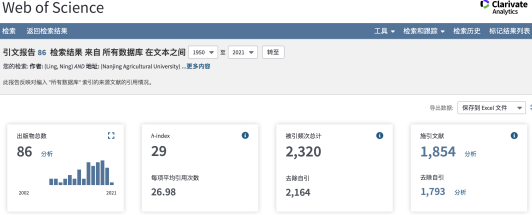Selected publications: Based on WoS:Total Publications: 86; H-index 29; Sum of times Cited: 2320.
 Selected Publications(Web of Science ResearcherID: AAF-3633-2019): 1)Liu WB,Ling N*, Luo GW, Guo JJ, Zhu C, Xu QC, Liu MQ, Shen QR, Guo SW (2021) Active phoD-harboring bacteria are enriched by long-term organic fertilization.Soil Biology and Biochemistry152: 108071https://doi.org/10.1016/j.soilbio.2020.108071(*Corresponding author) 2)Xu QC,Ling N*,Chen H, Duan YH, Wang S, Shen QR, Vandenkoornhuyse P (2020) Longterm chemical-only fertilization induces a diversity decline and deep selection on the soil bacteria.mSystems5:e00337-20.(*Corresponding author) 3)Luo GW, Xue C, Jiang QH, Xiao Y, Zhang FG, Guo SW, Shen QR,Ling N*(2020) Soil carbon, nitrogen, and phosphorus cycling microbial populations and their resistance to global change depend on soil C:N:P stoichiometry.mSystems5:e00162-20.(*Corresponding author) 4)Kong YL, Kuzyakov Y, Ruan Y, Zhang JW, Wang TT, Wang M, Guo SW, Shen QR,Ling N*(2020) DNA stable-isotope probing delineates carbon flows from rice residues into soil microbial communities depending on fertilization.Applied and Environmental Microbiology, 86:e02151-19(*Corresponding author) 5)Guo JJ,Ling N*,Chen ZJ, Li L, Liu LS, Gao LM, Wang M, Ruan JY, Guo SW, Vandenkoornhuyse P, Shen QR (2019).Soil fungal assemblage complexity is dependent on soil fertility and dominated by deterministic processes.New PhytologistDOI: 10.1111/nph.16345(*Corresponding author) 6)LuoGW, Sun B, Li L, Li MH, Liu MQ, ZhuYY, Guo SW,Ling N*, Shen QR (2019). Understanding how long-term organic amendments increase soil phosphatase activities: Insight into phoD- and phoC-harboring functional microbial populations.Soil Biology and Biochemistry139:107632.(*Corresponding author) 7)Kong Y,Ling N*, Xue C, Chen H, Ruan Y, Guo J, Zhu C, Wang M, Shen QR, & Guo SW (2019). Long-term fertilization regimes change soil nitrification potential by impacting active autotrophic ammonia oxidizers and nitrite oxidizers as assessed by DNA stable isotope probing.Environmental Microbiology,21(4): 1224-1240(*Corresponding author) 8)Luo G, Rensing C, Chen H, Liu M, Wang M, Guo S,Ling N*,Shen QR (2018) Deciphering the associations between soil microbial diversity and ecosystem multifunctionality driven by long-term fertilization management.Functional Ecology32:1103-1116.(*Corresponding author) 9)Luo G, Friman V-P, Chen H, Liu M, Wang M, Guo S,Ling N*,Shen Q (2018) Long-term fertilization regimes drive the abundance and composition of N-cycling-related prokaryotic groups via soil particle-size differentiation.Soil Biology and Biochemistry116:213-223.(*Corresponding author) 10)Ling N,Zhu C, Xue C, Chen H, Duan YH, Peng C, Guo SW, Shen QR. 2016, Insight into how organic amendments can shape the soil microbiome in long-term field experiments as revealed by network analysis.Soil Biology & Biochemistry. 99: 137-149 More details can be found in: https://www.researchgate.net/profile/Ning_Ling?ev=hdr_xprf |